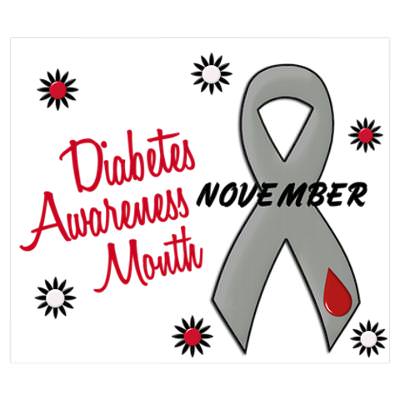November is Diabetes Awareness Month
When you have diabetes, your body has difficulty using glucose for energy. When you eat, your body turns most of the food you eat into glucose. A diabetic stores glucose in the blood instead of using it. This stored glucose can damage your body causing heart disease, blindness, nerve damage, kidney failure or stroke.
One in ten adults has diabetes, which the National Institute of Health estimates is 30 million people. The NIH also notes that one in three Americans are prediabetic, which is 84 million people! A prediabetic is someone starting to have increased glucose in their blood but it is not high enough to be diagnosed as diabetes.
There are various types of diabetes – you can learn about this from the American diabetic Association. I’d like to explore the prevention of TYPE 2 Diabetes. Type 2 diabetes is the most common form of diabetes. Normally your pancreas makes enough insulin to use the glucose you get from food. In type 2 diabetes, either the body does not produce enough insulin or the cells ignore the insulin. When you eat food your body breaks down all the sugars and starches into glucose, which is the basic fuel for the cells in the body. Insulin allows the sugar from the blood into the cells, so the glucose can be used. Diabetes is a chronic disease and can be progressive.
Here is the good news! You can do a lot to prevent and treat type two diabetes:
- Get regular check-ups with your doctor. Have him or her check your blood sugar. Most people don’t know if their blood sugar is elevated. Follow the instructions for your care.
- Find out if you are at risk for diabetes. You are at risk if you are: over 40 years of age; a male; a woman with gestational diabetes; have a family member who has diabetes; have been diagnosed with high blood pressure or high cholesterol; are not physically active; or are over weight.
- Eat healthy to stay at a healthy weight and if overweight reduce your weight even if only 10%. Include a variety of fruits and vegetables, low fat dairy and protein options. Cut back on saturated fats and exclude trans fats. Choose foods with unsaturated fats like seafood, nuts, seeds and oils. Share desserts. Fill your plate with ¼ protein, ¼ grains, ½ fruits and vegetables.
- Aim for at least two and a half hours weekly of moderate aerobic activity like gym activity, biking or fast walking. Take the exercise option in all you do.
If you have questions, call your doctor or me, your Parish Nurse.


